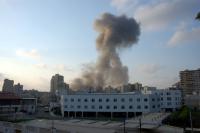-
Ahmadinejad demands Obama stop terror victims from collecting $2 billion court settlement
Former Iranian President Mahmoud Ahmadinejad sent a letter to President Barack Obama telling him to “quickly fix” a Supreme Court ruling allowing terror victims to collect $2 billion from frozen Iranian assets. The Supreme Court ruled 6–2 in April that 1,300 American victims of Iranian terror and their families were entitled to collect $2 billion in frozen funds, which are currently held in trust pending the final disposition of the lawsuits.
-
-
Former Bangladesh MP sentenced to death over 1971 war crimes
Sakhawat Hossain, a former member of parliament from the Islamist Jamaat-e-Islami party, was earlier today (Wednesday) sentenced to death by a special tribunal for commanding a paramilitary Islamist unit which killed, raped, and tortured unarmed civilians during the 1971 civil war in Bangladesh – then called East Pakistan. Jamaat-e-Islami, East Pakistan’s largest Islamist party, openly opposed secession from Pakistan and campaigned for continued Pakistani rule over East Pakistan. A few thousands members of Jamaat-e-Islami formed armed militias – trained and equipped by the Pakistani military – and fought along the Pakistani soldiers against fellow East Pakistanis.
-
-
Expert: Hezbollah’s storage of missiles in civilian areas will make next war “catastrophic”

The next war between Israel and Hezbollah “will be catastrophic” because the Iran-backed terror organization has stationed its military assets inside “built-up population centers in cities, towns and villages” in Lebanon, says an expert. In 2006 Hezbollah only had around 12,000 rockets and missiles at its disposal. It is now believed to have more than 110,000. Some analysts estimate that Hezbollah’s rocket and missile arsenal is greater than that of all twenty-seven non-U.S. NATO nations combined.
-
-
Brother-in-law of Charlie Hebdo killer arrested for trying to join ISIS
The brother-in-law of one of the gunmen who attacked the satirical magazine Charlie Hebdo in Paris in January 2015 has been detailed in Turkey, and deported to Bulgaria, on suspicion that he was trying to join ISIS in Syria. Mourad Hamyd was first arrested in January 2015 on suspicion that he was the getaway driver for the Kouachi brothers, who carried out the attack.
-
-
French Muslims propose tax on halal food to fund mosques, fight radicalization
Anouar Kbibech, president of the French Council of the Muslim Faith (CFCM), an influential group representing French Muslims, has proposed a tax on halal food to fund mosques and fight radicalization in France. The proposal was part of a broader counter-radicalization plan by French Muslims, a plan which also calls for the establishment of a new foundation which would help reduce the dependence of French mosques on foreign benefactors.
-
-
28-page section of the 9/11 Commission Report reveals “indirect link” to Saudi ambassador to U.S.
The 28-page section of the 9/11 Commission’s report, the only portion of the report not to have been made public, was finally released in July by the Obama administration (the section was, in fact, 29-page long). The heavily redacted version released to the public found an “indirect link” between a Colorado-based company associated with Prince Bandar bin Sultan, a key member of the Saudi royal family, who, for many years, wielded influence as the Saudi ambassador to the United States, and phone numbers held by an al-Qaeda member held over the 9/11 terror attacks. Money from a charity run by Bandar’s wife found its way to a Saudi man who helped two of the 9/11 hijackers settle in San Diego.
-
-
Indonesian police thwarts rocket attack on neighboring Singapore
Indonesia’s counter-terror police say they have thwarted a rocket attack on Singapore by arresting six suspected militants on Friday morning on Indonesia’s Batam island, about fifteen miles south-east of Singapore, a police spokesman said. Islamist terrorism in Indonesia, the world’s most populous Muslim nation, captured the headlines in 2002, when members of the Jemaah Islamiyah (JI) militant network killed 202 people, most of them foreign tourists, in Bali bombings. Since then, Islamist terrorist carried out smaller and less deadly attacks which targeted government agencies, mainly police and anti-terrorism forces.
-
-
Joy Karega, Oberlin professor who claimed Israel was behind 9/11, put on leave
Oberlin College professor Joy Karega, who was heavily criticized after she had posted Facebook status claiming that Israel was behind the rise of ISIS and the 9/11 and Charlie Hebdo terror attacks, has been put on leave and will be barred from teaching on campus while her case is reviewed, the school’s president said in a statement on Wednesday.
-
-
In dirty bomb prevention, Texas fails a crucial test
The clandestine group’s goal was clear: Obtain the building blocks of a radioactive “dirty bomb” — capable of poisoning a major city for a year or more — by openly purchasing the raw ingredients from authorized sellers inside the United States. It should have been hard. The purchase of lethal radioactive materials — even modestly dangerous ones — requires a license from the Nuclear Regulatory Commission, a measure meant to keep them away from terrorists. But a team of undercover bureaucrats with the investigative arm of Congress discovered that getting a license and then ordering enough materials to make a dirty bomb was strikingly simple.
-
-
German responses to terror range from cautious to conspiratorial
Until this month, Germany had been spared from terrorist attacks with momentous losses of life. Since 18 July, four attacks have occurred. While the attacks have been frequent, none has been as deadly as the attacks in Nice, Paris or Orlando. That is a perverse comfort in times when attacks occur daily. But Germans no longer feel like terrorism is a distant tragedy. Germany has yet to see large-scale terrorist attacks like those in France or Belgium. The sheer number of refugees and the limited number of attacks ultimately makes the link between refugees and terror weak. The polarization of political opinions about security, however, could threaten Chancellor Merkel’s chances for reelection in 2017.
-
-
Armed French police deployed on Channel ferries

Passenger ferries going between Britain and France are now being accompanied by armed sea patrols to protect them from jihadist attacks. In addition, marine gendarmes are now placed on ferries in the Channel and North Sea, as the two countries are in talks about allowing French security personnel togo on board ferries before the ferries leave English ports.
-
-
ISIS now operates in 18 countries: WH briefing document
A leaked briefing document written for the White House says that ISIS has “fully operational branches” in eighteen countries. A 2014 State Department documents said that ISIS was operating in only seven countries. In twelve countries, ISIS has “official branches,” and in six more countries it has “aspiring branches.”
-
-
600 armed police officers to protect London
The London police has launched Operation Hercules in which additional firearms officers will be deployed in visible roles in the capital. The Met will add 600 additional firearms officers to protect London against any attack. The first are now fully trained and operationally ready.
-
-
July 2016 terrorism: The numbers
The House Homeland Security Committee has just released its August Terror Threat Snapshot. The snapshot, produced by the Majority Staff of the committee, is a monthly committee assessment of the threat America, the West, and the world face from ISIS and other Islamist terrorists.
-
-
Apprehension: Aspen gathering of worried terrorism, security officials
An air of foreboding hanged over last week’s Aspen Security Forum, an annual gathering of the U.S. top past and present defense, intelligence, counter-terrorism, and diplomatic figures who are focused on protecting the American homeland. “All these recent terror attacks on soft targets, the growing cyberattacks, suggest this is the new normal, and it’s going to be with us for a while,” former Homeland Security inspector general Clark Kent Ervin said. “We’ve got all these evolving threats coming at us, and it’s disturbing that we did not see around the corner and anticipate this two years ago.”
-
- All
- Regional
- Water
- Biometrics
- Borders/Immig
- Business
- Cybersecurity
- Detection
- Disasters
- Government
- Infrastructure
- International
- Public health
- Public Safety
- Communication interoperabillity
- Emergency services
- Emergency medical services
- Fire
- First response
- IEDs
- Law Enforcement
- Law Enforcement Technology
- Military technology
- Nonlethal weapons
- Nuclear weapons
- Personal protection equipment
- Police
- Notification /alert systems
- Situational awareness
- Weapons systems
- Sci-Tech
- Sector Reports
- Surveillance
- Transportation
Advertising & Marketing: advertise@newswirepubs.com
Editorial: editor@newswirepubs.com
General: info@newswirepubs.com
2010-2011 © News Wire Publications, LLC News Wire Publications, LLC
220 Old Country Road | Suite 200 | Mineola | New York | 11501
Permissions and Policies
Editorial: editor@newswirepubs.com
General: info@newswirepubs.com
2010-2011 © News Wire Publications, LLC News Wire Publications, LLC
220 Old Country Road | Suite 200 | Mineola | New York | 11501
Permissions and Policies
